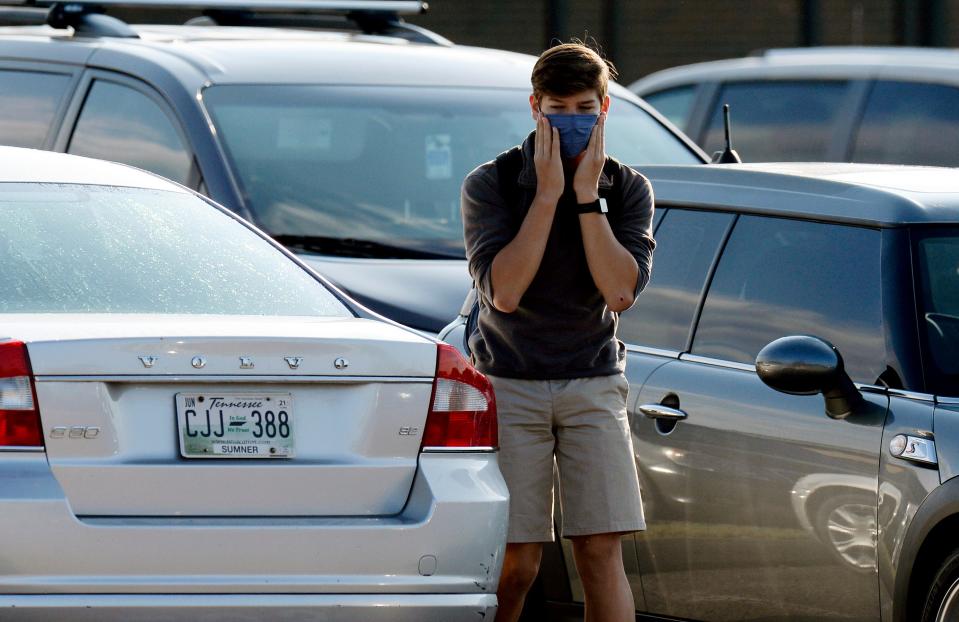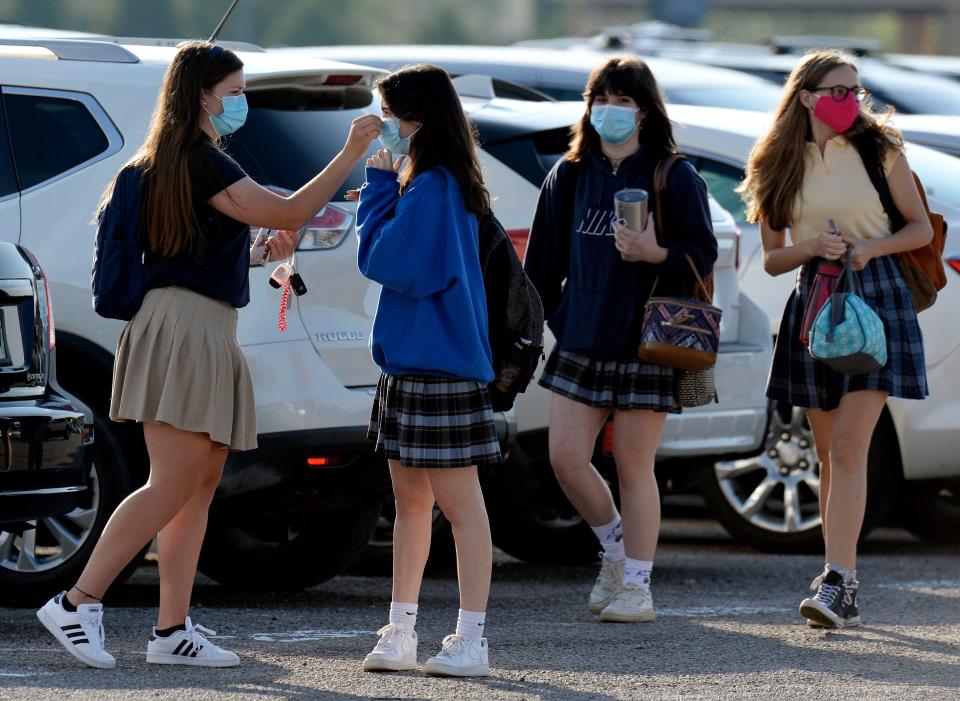'It's a hard choice': Tennessee parents send kids back to school amid new COVID-19 cases
NASHVILLE, Tenn. – Monday was back to school for students in Sumner County, Tennessee.
But unlike in past years, parents are grappling with difficult decisions as to how to send their children back safely as the novel coronavirus pandemic continues, and what those decisions will mean for their families.
Even as the vast majority of school districts around the country prepare to reopen in some form over the next month, new cases of COVID-19 were reported at schools that resumed in-person instruction last week in Indiana, Kentucky, Mississippi and elsewhere in Tennessee.
Sumner has remained among the counties reporting the highest case counts in Tennessee during the pandemic. There were 3,178 confirmed or probable COVID-19 cases in the county as of Monday, the latest data available from the Tennessee Department of Health. Of those, 1,348 cases are active. There have been 1,760 recoveries and 70 deaths.
Levels of comfort range among parents of students of varying ages and abilities.
Sumner County is one of the first districts in Middle Tennessee to return to classrooms – for some students – as part of its hybrid model.
Schools in more than two dozen school districts in Tennessee have already reopened as of Monday, the majority of them in person. Many of these districts are smaller, rural districts. At least nine confirmed coronavirus cases connected to reopening schools have already been reported in Tennessee.
A hybrid model
Sumner County's school year will begin with a phase-in hybrid plan from Aug. 3 through Aug. 14, with students whose last names begin with A through K attending traditional, in-person classes on Monday and Thursday with online learning through Sumner Connect and Google Classroom on the remaining days. Students whose last names begin with L through Z will attend traditional classes Tuesday and Friday.
Beginning Aug. 17, elementary students in kindergarten through fifth grade and all Comprehensive Development Class students will attend in-person classes five days per week. Pre-K programs will return to regular schedules, according to the district’s plans.
COVID-19 and schools: 260 employees in Georgia's largest school district test positive for or are exposed
In 10-day increments, officials will reevaluate and determine whether to keep the hybrid plan or whether to make changes.
Sumner County Mayor Anthony Holt extended the county's mask requirement through Aug. 29. Middle and high school students and all staff members are required to wear masks, per the order, and elementary students are "strongly encouraged," according to Sumner County Schools.

Director of Schools Del Phillips reviewed survey results in a Sumner County School Board meeting last month, less than two weeks before the first day of school.
Out of 7,284 responses, 29% of parents said the plans meet their families' needs, 38% said the plans "mostly" meet their families' needs, and 34% said the plans don't meet their families' needs.
How parents are preparing
Lorraine Looney doesn’t have anything against the hybrid plan. Her outlook is “pretty positive, in general,” and the two-week intervals make sense to her, given the ongoing pandemic.
A social worker and mother of three – in kindergarten and first and fifth grades – Looney is the founder of the Sumner County Special Needs Collaborative, a group that launched in June to advocate for people in Sumner County who have special needs. The collaborative bands people with special needs, families, caretakers and others together to help educate others.
Coronavirus and schools: Some parents want to hire tutors, start mini-schools this year. Most can't afford to.
Looney said the plans the school district has distributed seem “thorough” for many students, but not as much for those who have special needs. Days ahead of the start of the year, there were still many unanswered questions, so planning has been “frustrating.”
“It’s really been kind of a wild goose chase,” Looney said. Later, she added, “(It’s) important for parents to be informed and to know how to be their child’s best advocate.”
Although some parents opted for virtual learning and other options, others felt “forced” to send their kids to school in person using the hybrid model.

Vickie Rogan said she “begged” over the phone for more time to enroll in virtual learning after the July 26 deadline passed, a deadline she said she didn’t know about until after it had come and gone.
Rogan cares for two of her grandchildren, ages 9 and 10, and worries that at a higher risk, she’s “going to get sick” if they bring home germs.
She would rather home-school them. But days before the first day of school, she didn’t know what to do.
“They cannot make you send your child to school during a pandemic,” Rogan said, adding later, “I don’t know what to do. ... I’ve been planning all summer long for them to do virtual (learning)."
More back to school coverage: Kids' mental health can struggle during online school. Here's how teachers are planning.
Christy Lockwood’s daughter is a rising junior at Merrol Hyde Magnet School in Hendersonville.
Lockwood said she had “no choice" but to send her to school in person, even though she would have been more comfortable continuing virtual learning at home, as the district transitioned to last spring, which “for her it worked out actually very well.”
One of the classes that she needs is not available for the virtual-only option.
Her daughter – equipped with a mask and hand sanitizer at all times – is looking forward to seeing her friends again but is old enough to understand the “severity” of the virus that’s still spreading statewide. Lockwood said she has diabetes and knows that the impact to her could be severe if she is exposed to COVID-19.
Exposure was also a concern for Jessica Jones, who initially enrolled her son in kindergarten but ended up keeping him home.
But that decision "wasn't made lightly."
COVID-19 and schools: An Indiana school reopened for students. There was a positive COVID-19 test on day one.
“It’s a hard choice, but I’m thankful that we have the option,” Jones said. Her biggest concern now is that he won’t have the speech teacher he saw weekly, but the family is looking into other resources.
“I don’t think there’s a wrong choice, though,” said Jones, who is confident in the school system.
She emphasized the importance of parents making decisions for their children that they’re comfortable with, knowing that some have to send their kids to school for one reason or another.
“I don’t think there’s a wrong choice in how to school your child ... whatever you have to do,” Jones said. “Everything has been thought out and planned for these kids.”
This article originally appeared on Nashville Tennessean: COVID-19: Tennessee parents send kids back to school amid new cases

